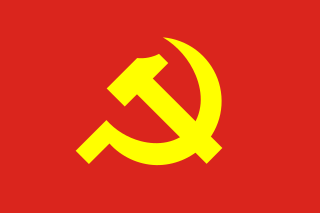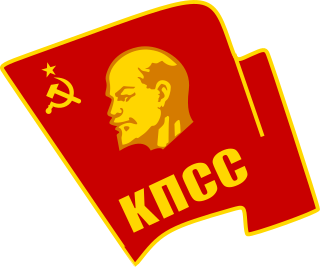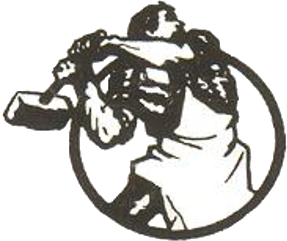Related Research Articles

The Communist Party of China (CPC) is the founding and ruling political party of the People's Republic of China (PRC). The CPC is the sole governing party within mainland China, permitting only eight other, subordinated parties to co-exist, those making up the United Front. It was founded in 1921, chiefly by Chen Duxiu and Li Dazhao. The party grew quickly, and by 1949 it had driven the nationalist Kuomintang (KMT) government from mainland China after the Chinese Civil War, leading to the establishment of the People's Republic of China. It also controls the world's largest armed forces, the People's Liberation Army.

The Communist Party of the Soviet Union (CPSU) was the founding and ruling political party of the Soviet Union. The CPSU was the sole governing party of the Soviet Union until 1990, when the Congress of People's Deputies modified Article 6 of the most recent 1977 Soviet constitution, which had granted the CPSU a monopoly over the political system.

Leninism is the political theory for the organisation of a revolutionary vanguard party and the achievement of a dictatorship of the proletariat as political prelude to the establishment of socialism. Developed by and named for the Russian revolutionary Vladimir Lenin, Leninism comprises socialist political and economic theories, developed from Marxism and Lenin's interpretations of Marxist theories, for practical application to the socio-political conditions of the Russian Empire of the early 20th century.
The politics of the People's Republic of China takes place in a framework of a socialist republic run by a single party, the Communist Party of China, headed by the General Secretary. State power within the People's Republic of China (PRC) is exercised through the Communist Party, the Central People's Government and their provincial and local representation. The state uses Internal Reference, secret documents produced by Xinhua News Agency, similar to US' President's Daily Brief, though delivered to most of its officials according to level of secrecy of the information, a major source of information of the society.

The politics of Vietnam are defined by a single-party socialist republic framework, where the General Secretary of the Communist Party of Vietnam is the Party leader and head of the Politburo, holding the highest position in the one-party system. The President of Vietnam is the head of state, and the Prime Minister of Vietnam is the head of government in a one-party system led by the Communist Party of Vietnam. Executive power is exercised by the government and the President of Vietnam. Legislative power is vested in the National Assembly of Vietnam. The Judiciary is independent of the executive. The parliament adopted the current Constitution of Vietnam; its fifth, on 28 November 2013.

The Socialist Unity Party of Germany, often known in English as the East German Communist Party, was the governing Marxist–Leninist political party of the German Democratic Republic from the country's foundation in October 1949 until its dissolution after the Peaceful Revolution in 1989. The party was established in April 1946.

A Communist state is a state that is administered and governed by a single party, guided by Marxist–Leninist philosophy.

The Portuguese Communist Party is a major political party in Portugal. It is a Marxist–Leninist party, and its organization is based upon democratic centralism. The party also considers itself patriotic and internationalist.

The Communist Party of Vietnam (CPV) is the founding and ruling communist party of the Socialist Republic of Vietnam. Although it nominally exists alongside the Vietnamese Fatherland Front, it maintains a unitary government and has centralised control over the state, military and media. The supremacy of the Communist Party is guaranteed by Article 4 of the national constitution. The CPV was founded in 1930 by Hồ Chí Minh and since 1945, it has been the only legal party in the country alongside the former South Vietnam when it took over in 1975 at the end of the Vietnam War. It also controls the military, the People's Army of Vietnam.

The Party of Labour of Albania (PLA), sometimes referred to as the Albanian Workers' Party (AWP), was the vanguard party of Albania during the communist period (1945–1991) as well as the only legal political party. It was founded on November 8, 1941, as the Communist Party of Albania, but its name was changed in 1948. In 1991, the party was succeeded by the Socialist Party of Albania. For most of its existence, the party was dominated by its First Secretary, Enver Hoxha, who was also the de facto leader of Albania.

The 10th National Congress of the Communist Party of Vietnam was held in Ba Đình Hall, Hanoi from 18 to 25 April 2006. The congress occurs every five years. 1,176 delegates represented the party's 3 million members. At the 13th plenum of the Central Committee, held before the congress, it was decided that eight members of the Communist Party's 9th Politburo had to retire. While certain segments within and outside the Politburo were skeptical, the decision was implemented. Because of party rules, the congress was not empowered to elect the general secretary, and it held a survey on whom the delegates wanted to be appointed General Secretary. The first plenum of the Central Committee, held in the immediate aftermath of the congress, re-elected Nông Đức Mạnh as general secretary.

The Communist Party of Ukraine, was the founding and ruling political party of the Ukrainian Soviet Socialist Republic operated as a republican branch of the Communist Party of the Soviet Union (CPSU). The CPU was the sole governing party was founded in 1918 as the Communist Party (Bolshevik) of Ukraine until 1952, when it became the Communist Party of Ukraine. The party was liquidated in 26 August 1991 after the failed Soviet coup in Moscow.
A popular front is a broad coalition of different political groupings, usually made up of leftists and centrists. Being very broad, they can sometimes include centrist Radical or liberal forces as well as social-democratic and communist groups. Popular fronts are larger in scope than united fronts.

Impossibilism is a Marxist theory that stresses the limited value of political, economic, and social reforms under capitalism. As a doctrine, impossibilism views the pursuit of such reforms as counterproductive to the goal of achieving socialism as they stabilize, and therefore strengthen, support for capitalism. Impossibilism holds that reforms to capitalism are irrelevant or outright counter-productive to the goal of achieving socialism and should not be a major focus of socialist politics.

The 6th Congress of the Workers' Party of Korea (WPK) was held in the February 8 House of Culture in Pyongyang, North Korea, from 10–14 October 1980. The congress is the highest organ of the party, and is stipulated to be held every four years. 3,062 delegates represented the party's membership; 117 foreign delegates attended the congress, without the right to speak. The congress saw the reappointment of Kim Il-sung as WPK General Secretary and the Presidium of the Politburo established as the highest organ of the party between congresses.
The organization of the Communist Party of China (CPC) is based upon the Leninist idea of democratic centralism.

Soviet democracy is a political system in which the rule of the population by directly elected soviets is exercised. The councils are directly responsible to their electors and are bound by their instructions. Such an imperative mandate is in contrast to a free mandate, in which the elected delegates are only responsible to their conscience. Delegates may accordingly be dismissed from their post at any time or be voted out (recall).
References
- ↑ Menonite Central Committee web site
- ↑ "Organs of the Likud | The Likud Party" . Retrieved 6 March 2017.